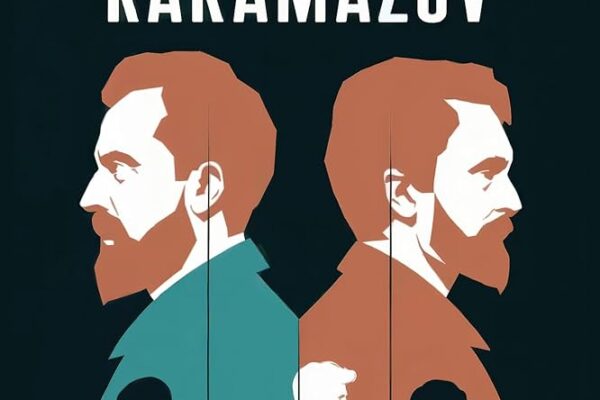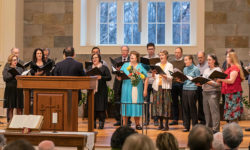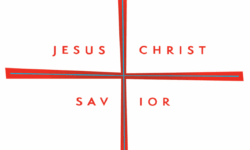
Why Read The Brothers Karamazov?
June 2, 2025 | Laura Matthews
Stone Hill Arts Book Club: The Brothers Karamazov | June 30 @ 6:30 p.m.
Discussion led by Dr. Laura Matthews, Lecturer in Slavic Languages and Literatures at Princeton University
Location: Stone Hill Church Ristuccia Library (1025 Bunn Dr. Princeton)
Free and open to the public
Read for free online
If I were to list all the reasons why you should read Fyodor Dostoevsky’s The Brothers Karamazov, this might be as long as the novel itself. Now, I know that the novel’s length can be quite intimidating, but no other book has impacted my life or my faith as much as this one, so I strongly urge you to read this novel – or at least a small part of it! – and join me to discuss why it is such a compelling work of literature, of philosophy, and of religious thought, and how it continues to speak to us and move us today.
Published between 1879 and 1880, the year before Dostoevsky died, The Brothers Karamazov is his final and greatest novel. The novel’s central question is the problem of the existence of evil and suffering in a world created by a God of love. How do we make sense of that? In Part II Book V, “Pro and Contra,” which Dostoevsky described as the culminating section of the novel, he presents a character, Ivan Karamazov, in rebellion against God. Ivan is outraged at the lack of justice and at the abuse of the innocent and thus objects to Christ and to the ordering of God’s world. He does not understand how a loving and good God would give human beings free will knowing that it would be used to cause harm (to self and to others) and ultimately lead to suffering and unhappiness. In a poem written by Ivan, called the “Legend of the Grand Inquisitor,” Ivan questions whether it would be better for humanity to have freedom (free will) with the suffering that will inevitably come from that, or to be deprived of freedom, but to be assured contentment and well-being within a rationalized organization of life. The Grand Inquisitor ultimately rebukes Christ for giving people freedom when it has led to such great suffering.
To Dostoevsky, himself a believer in Christ, Ivan’s views were blasphemous. But Dostoevsky does not paint Ivan as a despicable, unredeemable character. Ivan gets distraught at the injustices in the world around him, and his protest against God’s world is couched in terms of the Christian value of compassion. Dostoevsky depicts Ivan with so much empathy. The questions that Ivan raises are personal for Dostoevsky, as they reflect his own doubts about God’s goodness given the unmerited suffering of little children, which he wrestled with throughout his life, but was particularly fresh at this moment, given the death of his three-year-old son Alyosha as Dostoevsky was in the early stages of writing this novel. Guilt over his own complicity in his son’s death (Alyosha died from an epileptic fit – a condition that the boy had inherited from his father) mingled with the sorrow he and his wife felt as they were grieving contributed to the raw and real condemnation of what feels like God’s silence in the face of unjust suffering.
Having used a character to voice his doubts and questions about faith, Dostoevsky then spends the rest of the novel articulating an answer to those concerns. Dostoevsky admitted that Ivan’s theme of the senseless suffering of children was one that he personally found to be “irrefutable.” Is there a way to accept both God and His order of the world when one’s heart and mind cannot grapple with the evil around us? If Dostoevsky is to counter Ivan’s blasphemy, how can he do that? In the following book (Part II Book VI), called “The Russian Monk,” Dostoevsky puts forward answers to Ivan’s opposition to Christ through the lives of Father Zosima and Ivan’s brother, Alyosha, and through the way they put into practice the ideas of Christian love.
Throughout the novel, but especially in this section, Dostoevsky paints a picture of active, tangible, sacrificial love: love for another person – for every person – “for no reason,” not responding to their prior love towards us, nor hoping for anything in return – love for the sake of love. Zosima acknowledges that this type of love without reason will seem “senseless” or “irrational” to many in our world, and yet it is through this type of love that we can learn to love others even in the midst of the world’s cruelty and injustices, and to love as a means to combat those forces. Father Zosima, and through him, Dostoevsky, calls on us to “love a man even in his sin, for that is the semblance of divine love and is the highest love on earth.” Love is a continual choice, and it is not an abstract stance, but a lived-out action. Dostoevsky argues that the way we should respond to the overwhelming evil in the world around us is to not disengage or despair, but to lean into this hurting world and, following Christ’s example, love others with Christ’s active love, and thereby become the hands and feet of Jesus and be part of the mission to bring hope, healing, and redemption to this world.
Ivan’s argument against Christ in many ways seems powerful and logically convincing. So, the question is whether “The Russian Monk” is a successful refutation of the ideas set forth in “Pro and Contra.” Dostoevsky himself wrestled with this as he wrote his novel, anxious about whether his portrayal of Zosima would successfully show people that real Christianity is the only solution and refuge for our world from its evils, or if Ivan’s argument was too logically overpowering. He wrote to a friend that he was praying God would enable him to succeed in making this section of the novel moving and compelling. Do you think he succeeded? Are the rebuttals to Ivan’s arguments in the examples of Zosima and Alyosha strong enough to stand up to Ivan’s critique of Christ? Which of the views presented do you find most convincing? How do you personally make sense of injustice and evil in the world? Is God truly loving at all times? Is active love – the kind that Christ had for us and that we are called to emulate in our treatment of those around us – actually powerful enough to counter the hatred in the world? Do any of Ivan’s oppositions to Christ resonate with you, even a little? And if so, how will you make sense of that?
This novel reaches into our minds, hearts, and souls, challenging our theories and beliefs by posing questions that it forces us to confront and to answer for ourselves. No other writer has made me honestly admit and grapple with my deepest doubts as Dostoevsky has. His novels pull you in and engage you in such a way that you cannot help but wrestle with the big questions for yourself. It can be uncomfortable, and certainly convicting and challenging, but – in my experience – so incredibly worth it. God has used this novel in my life to fight the tendency to be lukewarm in my beliefs, especially those aspects of faith that I question the most, and ultimately strengthen my faith and pull me closer to Him. It has pushed me to reexamine my values and ask myself to what extent is my life an external manifestation of the beliefs I hold.
The Brothers Karamazov is a work of incredible moral, psychological, philosophical, and artistic complexities. During our Book Club, we’ll unpack some of these complexities and then turn to a discussion of how the questions impact us today. We will focus on Part One and Part Two of the novel, specifically Book Two “An Inappropriate Gathering,” Book Five “Pro and Contra,” and Book Six “The Russian Monk,” so if you’re pressed for time, you can just focus on those. Whether you’ve read the whole novel, or are just curious to hear more, I hope you will join me on Monday the 30th of June as we dive into this novel – and reflect on its enduring relevance for each of our lives today.






